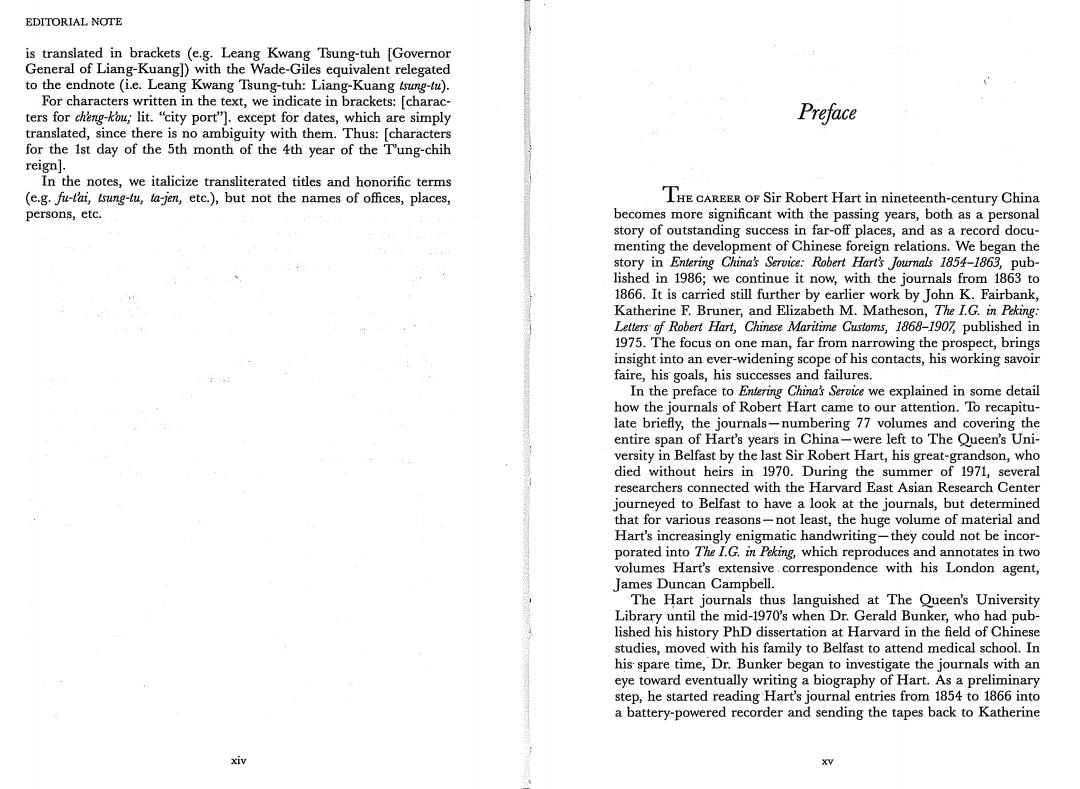正在加载图片...

EDITORIAL NOTE is translated in brackets (e.g.Leang Kwang Tsung-tuh [Governor General of Liang-Kuangl)with the Wade-Giles equivalent relegated to the endnote (i.e.Leang Kwang Tsung-tuh:Liang-Kuang tsung-tu). For characters written in the text,we indicate in brackets:[charac- ters for cheng-kou;lit."city port"].except for dates,which are simply Preface translated,since there is no ambiguity with them.Thus:[characters for the Ist day of the 5th month of the 4th year of the Tung-chih reign. In the notes,we italicize transliterated titles and honorific terms (e.g.fu-tai,isung-tu,tajen,etc.),but not the names of offices,places, THE CAREER oF Sir Robert Hart in nineteenth-century China persons,etc. becomes more significant with the passing years,both as a personal story of outstanding success in far-off places,and as a record docu- menting the development of Chinese foreign relations.We began the story in Entering China's Service:Robert Hart's Journals 1854-1863,pub- lished in 1986;we continue it now,with the journals from 1863 to 1866.It is carried still further by earlier work by John K.Fairbank, Katherine F.Bruner,and Elizabeth M.Matheson,The I.G.in Peking: Letters of Robert Hart,Chinese Maritime Customs,1868-1907,published in 1975.The focus on one man,far from narrowing the prospect,brings insight into an ever-widening scope of his contacts,his working savoir faire,his goals,his successes and failures. In the preface to Entering Chinas Service we explained in some detail how the journals of Robert Hart came to our attention.To recapitu- late briefly,the journals-numbering 77 volumes and covering the entire span of Hart's years in China-were left to The Queen's Uni- versity in Belfast by the last Sir Robert Hart,his great-grandson,who died without heirs in 1970.During the summer of 1971,several researchers connected with the Harvard East Asian Research Center journeyed to Belfast to have a look at the journals,but determined that for various reasons-not least,the huge volume of material and Hart's increasingly enigmatic handwriting-they could not be incor- porated into The I.G.in Peking,which reproduces and annotates in two volumes Hart's extensive.correspondence with his London agent, James Duncan Campbell. The Hart journals thus languished at The Queen's University Library until the mid-1970's when Dr.Gerald Bunker,who had pub- lished his history PhD dissertation at Harvard in the field of Chinese studies,moved with his family to Belfast to attend medical school.In his spare time,Dr.Bunker began to investigate the journals with an eye toward eventually writing a biography of Hart.As a preliminary step,he started reading Hart's journal entries from 1854 to 1866 into a battery-powered recorder and sending the tapes back to Katherine xiv